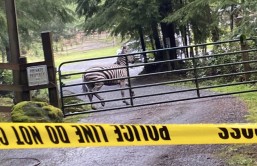After a British family discovered dozens of potentially deadly baby spiders growing in a banana they had purchased from a local supermarket, they evacuated their home so that it could be fumigated, ABC News reports.
Cosni Taylor noticed a small white patch on the banana she was halfway through eating that she thought might be mold, but upon closer inspection, discovered that it contained dozens of tiny spiders.
"I had a closer look and was horrified to see they were spiders," Taylor, 29, told the UK The Sun newspaper. "They were hatching out on the table, scurrying around on my carpet." She took a photo and contacted a local pest control company, which confirmed that the spiders could be the deadly Brazilian wandering spiders, a "species that Guinness World Records designated the world's most venomous spider in 2010," according to ABC News.
According to Stuart Hine, manager of identification and advisory service at the National History Museum in London, Taylor and her family's decision to fumigate their home was ultimately a "wholly unnessecary" move, as only one in about 500 spiderlings make it to adulthood even in the wild.
Steven Falk, an entomologist with the invertebrate conservation trust Buglife, echoed Hine's sentiments.
"The truth is often very mundane," Falk told ABC News. "A baby spider doesn't have big enough jaws to bite you."
Nonetheless, Taylor was spooked enough to call for help. The banana was purchased from Sainsbury's, the supermarket awarding her a $16 gift card in compensation which they called an "initial act of good will," and have hired their own spider expert to help prevent against future incidents with any creepy crawlies.
"We're very sorry and have apologized to Mr. and Mrs. Taylor," the store wrote in a statement. "We do have rigorous controls on imported products at all stages - from harvesting to transportation - which is why this is so rare." They added that the spiders in Taylor's banana were "likely to be a foliage spider or Cheiracanthium" and that "all forms of wandering spider are unlikely to survive in this country [the U.K.], either inside or outside, due to their need for warmth and humidity.
Click here to see a photo of the banana infested with potentially deadly spiders.








